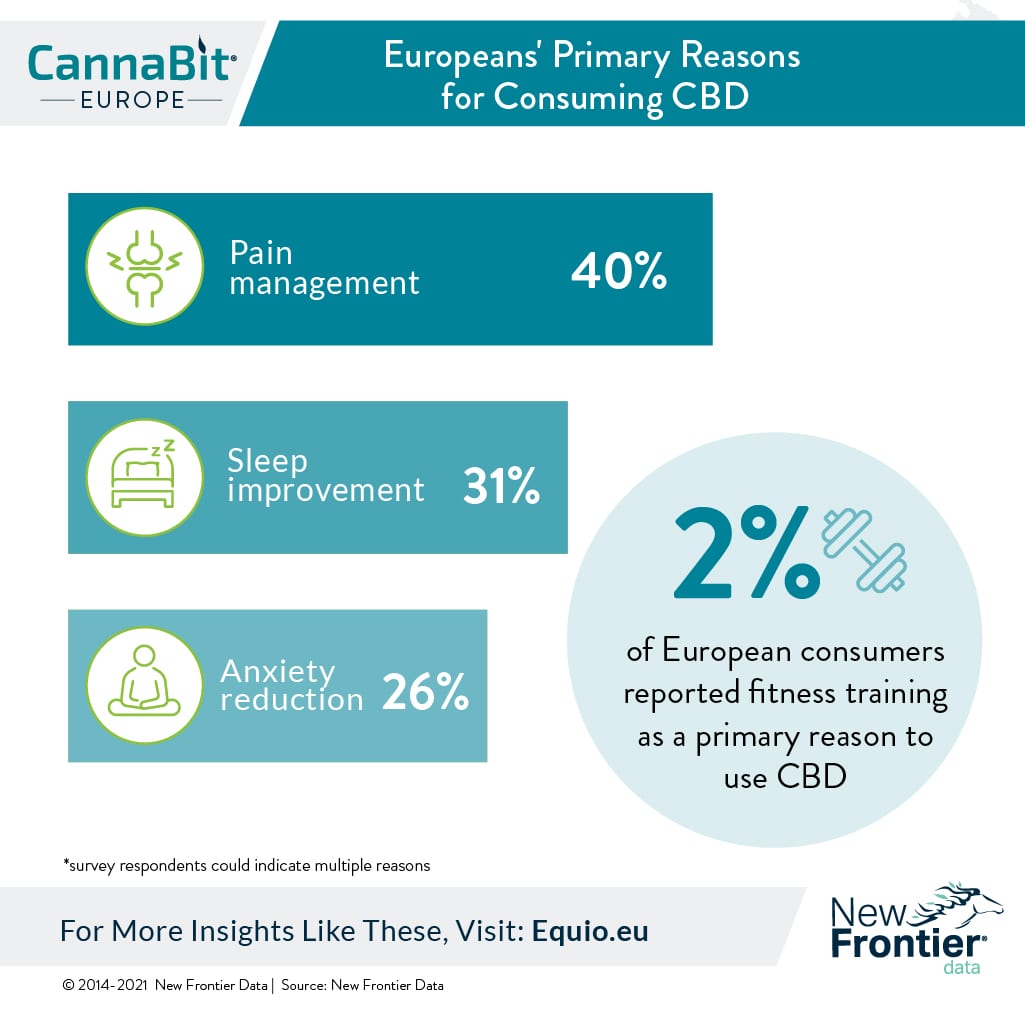CBD Marketers Hope to Celebrate the Olympics As a Whole New Game

By Oliver Bennett, Special Contributor to New Frontier Data
In this summer of sport with tennis, soccer, and the Tokyo 2020 Olympic Games (delayed a year due to COVID-19) due to start this week, public attention will return once again to athletic performances.
This summer’s games have been marked as the first Olympics where athletes can legally use CBD, even during the competition itself. The lifting of the CBD ban by the World Anti-Doping Agency (WADA) in 2019 (while still prohibiting all natural and synthetic cannabinoids) means that CBD is hypothetically allowed in high-level competitive sports – though any athlete considering taking it should be very careful about their sourcing, as any THC content is prohibited.
Thus, CBD could find a new sporting moment. With increasing evidence of its efficacy for helping athletes, CBD has within the last few years become a big part of sports therapy, mainly for pain relief and complementary anti-inflammation, but also to control stress levels and even to enhance performance. The growing wellness market is reflected in ranges of new products from ingestibles, balms, and oils, to sports drinks.
Following the cue of the US, where CBD has a huge reputation among the arenas of the NFL, MMA and golf, usage has been growing fast – though there are still some qualms at poor labelling and unwritten professional codes.
In the U.K., a growing interest for CBD in sports includes a newly publicized firm in Scotland, called Pure Sport CBD. Begun by rugby players Grayson Hart and Adam Ashe, the company claims to be among the first in the U.K. to be accredited under the government’s Food Standards Agency (FSA). Started two years ago to provide an alternative to mainstream painkillers, sales for Pure Sport have increased 300% during the pandemic. As Hart explained, with £2.6 million ready for investment in a new facility and wellness space, “We have an ambition to make Pure Sport the biggest and best CBD brand in the world, and this round of investment marks a significant step on the road to achieving it.”
As CBD’s popularity has raged, large firms are getting in on the act with an eye to the European market. Canadian company The Green Organic Dutchman recently announced that its European subsidiary HemPoland has launched CannabiGold Sport – CBD workout supplements for professional and recreational athletes and with different grades of the supplement for people in different stages of training.
CBD has also gained a growing reputation has been big in the martial arts and boxing realms. London-based CBD brand Love Hemp is showcased on BT Sport’s Ultimate Fighting Championships (UFC), and MMA fighter and UFC welterweight champion George St-Pierre has become a brand champion and influencer: “I believe that using Love Hemp’s CBD products in my training helped my recovery and overall well-being greatly.”
Creso Pharma, out of Australia, has entered the European sports and recreation CBD market with Impactive’s CBD roller application in Switzerland and Europe designed to reduce muscle and joint inflammation. Creso’s brand Cannadol is supported by sports influencer Jenny Dietschweiler who said that the oil “brings substantial fast relief to joints and the muscles after intensive training.”
The companies and brands are trying to lead policy objectives, sometimes against glacial professional and governmental bodies. For example, U.K. sports CBD and nutrition brand Fourfive has urged the U.K.’s sports-governing bodies to begin trials into CBD to look into pain management, sleep disorders and anxiety, taking a cue from the U.S., where the NFL’s Players Association (NFLPA) led a $1 million research effort into sports and CBD’s effects on pain and performance. “We want the U.K.’s sport bodies including the RFU, the FA and even Sport England to step up and commit to research which looks at the benefits of CBD and medicinal cannabis so the industry can fulfil its potential,” said Dom Day, co-founder, Fourfive.
The overall market for CBD in the U.K. is expected to be worth €802 million (£690 million) by the end of 2021. But sports-related CBD has still a way to go for market share. Just 2% of the EU’s CBD consumers state fitness training as a reason for using CBD, though 40% say they use CBD to manage pain, 31% to improve sleep, and 26% to reduce anxiety – all factors that would enhance a sporting life. And while it should be considered in the same way as all other dietary supplements, CBD’s current regulatory status in U.K. sport still lacks clarity.
One aspect of CBD’s use in sports is as an alternative for painkillers such as ibuprofen or even opioids. U.K. company Endosport has said that athletes are now choosing to use CBD oil to reduce inflammation and ease pain, as well as to quell nerves before competing. There is also the fillip of a sporting name to add to a brand’s marketing effort. London-based company Cellular Goods gained much publicity when it floated on the London stock exchange in February thanks to ex-soccer star David Beckham’s being a named investor. With all the activity, the CBD and sports link-up is clearly on the up – with the proviso that both product provenance and regulatory codes from official sporting bodies remain in need of work.
The post CBD Marketers Hope to Celebrate the Olympics As a Whole New Game appeared first on New Frontier Data.
 #CBD #Hemp https://newfrontierdata.com/cannabis-insights/cbd-marketers-hope-to-celebrate-the-olympics-as-a-whole-new-game/ July 19, 2021 11:59 pm
#CBD #Hemp https://newfrontierdata.com/cannabis-insights/cbd-marketers-hope-to-celebrate-the-olympics-as-a-whole-new-game/ July 19, 2021 11:59 pm
